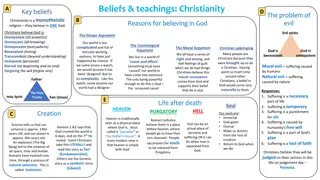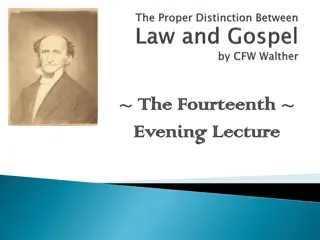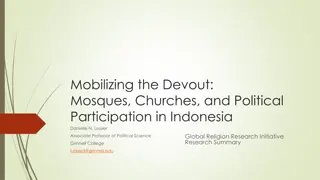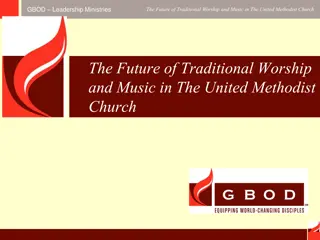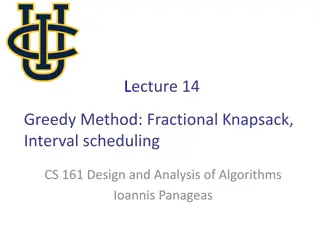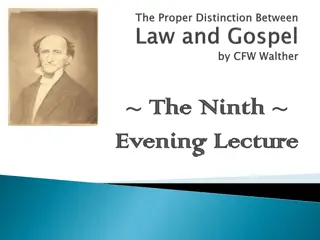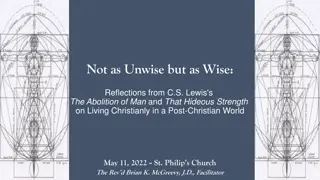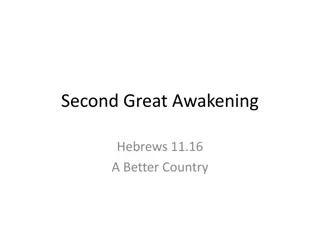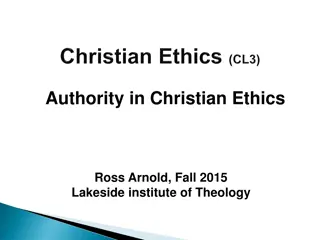
Understanding Christian Denominations and Branches
Explore the diverse Christian denominations, their core beliefs, historical development, and major branches such as Roman Catholicism, Eastern Orthodoxy, Protestantism, and Pentecostalism. Learn how these denominations differ in rituals, beliefs, and practices while sharing common foundational doctrines.
Uploaded on | 2 Views
Download Presentation

Please find below an Image/Link to download the presentation.
The content on the website is provided AS IS for your information and personal use only. It may not be sold, licensed, or shared on other websites without obtaining consent from the author. If you encounter any issues during the download, it is possible that the publisher has removed the file from their server.
You are allowed to download the files provided on this website for personal or commercial use, subject to the condition that they are used lawfully. All files are the property of their respective owners.
The content on the website is provided AS IS for your information and personal use only. It may not be sold, licensed, or shared on other websites without obtaining consent from the author.
E N D
Presentation Transcript
Christian Denomination A Christian or religious denomination is a subgroup or church within a religion that operates under a common name, tradition, and identity. Christian denominations tend to believe in common core beliefs: 1. Trinity 2. Divine Inspiration of the Scriptures 3. Original and Personal Sin 4. Grace, Forgiveness and Salvation through Jesus Christ 5. Baptism and Eucharist 6. Resurrection
Christian Denominations However, Christian Denominations have some differences in their beliefs, rituals and prayers. Christian Denominations developed throughout history for various reasons.
Jody Ondich, LibreTexts: Humanities.4.3: Christianity LibreTextshttps://human.libretexts.org/Bookshelves/Religious_Studies/World_Religions:_The_Spirit_Searching_(Ondich)/04:_Middle_Easter n_Origins/4.03:_Christianity
Christian Denominations Christianity has divided into four major branches over the centuries. Each denomination has its own distinctive beliefs or practices, but they are generally considered a branch of mainstream Christianity if they agree on core doctrines like the divinity of Jesus Christ and the authority of the Bible. Relationships between denominations range from mutual respect and cooperation to denial that the other group is really "Christian."
Christian Denominations The four main branches of Christianity are Roman Catholicism, Eastern Orthodoxy, Protestantism and Pentecostal.
Christian denominations Roman Catholicism represents the continuation of the historical organized church as it developed in Western Europe, and is headed by the Pope. Eastern Orthodoxy (which includes the Greek and Russian Orthodox Churches and several others) is the continuation of the historical organized church as it developed in Eastern Europe. It differs from Catholicism in its refusal of allegiance to the Pope, its emphasis on the use of icons in worship, and the date it celebrates Easter. Other cultural, political, and religious differences exist as well. Eastern Orthodoxy and Roman Catholicism separated in 1054 AD, when the Patriarch of Constantinople and the Pope excommunicated each other.
Christian Denominations Protestantism arose in the 16th century during the Reformation, which took place mainly in Germany, Switzerland, and Britain. Protestants do not acknowledge the authority of the Pope, reject many traditions and beliefs of the Catholic Church, emphasize the importance of reading the Bible and hold to the doctrine of salvation by faith alone. Protestantism encompasses numerous denominational groups, including Lutherans, Baptists, Methodists, Episcopalians (or Anglicanism), Presbyterians, Pentecostals and Evangelicals.
Christian Denominations Pentecostals are the fourth group of Christian Denominations that developed out of Protestantism. They emphasise the saving power of God and the work of the Holy Spirit





